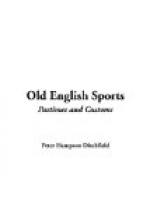The Boar’s Head, I understand,
Is the chief service in this land;
Look wherever it be fande:
Servile cum cantico.
Be glad, lords, both more and
lasse,
For this hath ordained our steward
To cheer you all this Christmasse,
The Boar’s Head with mustard.[18]
Neither were the ale and wassail-bowl forgotten, and they circulated sometimes too often, I fear, and laid the seeds of gout and other evils, from which other generations suffer. But when the prodigious appetites of the company had been appeased, the maskers and mummers entered the hall and performed strange antics and a curious play, fragments of which have come down to our own time. The youths of the villages of England still come round at Christmas-time and act their mumming-drama, in which “St. George” kills a “Turkish knight,” who is raised to life by “Medicine Man,” and performs a very important part of the play—passing round the money-box. This is a remnant of the mumming of ancient days, and perhaps of some “mystery” play, of which I told you in a previous chapter.
In Berkshire the characters are represented by “Molly,” a stalwart man dressed in a woman’s gown, shawl, and bonnet, with a besom in his hand, who strives in his dialogue to imitate a woman’s voice; King George, a big burly man dressed as a knight, with a wooden sword and a home-made helmet; a French officer, with a cocked hat and sword; a Doctor, who wears a pig-tail; Jack Vinny, a jester; Happy Jack, a humorous character dressed in tattered garments, and Old Beelzebub, who appears as Father Christmas. In some parts of the royal county the part of King George is taken by an “Africky king,” and a Turkish knight instead of the French officer. Very curious are the words of the old play, and very ludicrous the representation when the parts are acted by competent players.
There was also in the baron’s hall a great person dressed in a very fantastic garb, who was here, there, and everywhere, directing the mummers, making jokes to amuse the company, and looking after everybody. He was called the “Lord of Misrule.” Sometimes his rule was harmless enough, and did good service in directing the revels; but often he was more worthy of his name, and was guilty of all kinds of absurd and mischievous pranks, which did great harm, and were very profane. But these were not part of the Christmas feast, where all was happiness and mirth. Sir Walter Scott says, in his description of the festival—
“England was merry England
when
Old Christmas brought
his sports again;
A Christmas gambol oft
would cheer
A poor man’s heart
through all the year.”
All the old poets sing in praise of the great day which, as Herrick says, “sees December turned to May,” and which makes the “chilling winter’s morn smile like a field beset with corn.” Old carols chant in reverent strains their homage to the infant Saviour: some reflect time-honoured customs and social joys when old age casts aside its solemnity and mingles once more in the light-hearted gaiety of youth, and all unite in chanting the praises of this happy festival. The poet Withers sings—




